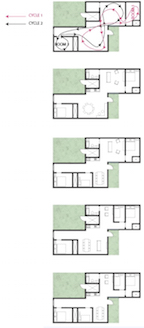Editor’s note: Links to images for download appear at the end of this release.
David Ruth
713-348-6327
david@rice.edu
Mike Williams
713-348-6728
mikewilliams@rice.edu
Rice University students invited to 2017 Solar Decathlon
Student team plans to build house with net-zero energy use for international competition
HOUSTON – (Jan. 21, 2016) – Rice University students plan to design and build a house for the 2017 Solar Decathlon, a Department of Energy-sponsored competition to advance the art and technology of environmentally friendly dwellings.
Rice is one of 16 international college teams invited to the biennial competition in October 2017 at a site to be determined. They will compete for $2 million in prize money.
This will be the second time Rice has competed in the Solar Decathlon. The university’s entry in the 2009 Solar Decathlon, the ZeRow House, finished in eighth place on the National Mall in Washington, D.C. That building is now located in Houston’s Third Ward as an artist’s residence for Project Row Houses.
The new effort, under the umbrella of the Rice Building Workshop, is led by co-captains Caroline Brigham, a junior architecture student, and Travis Kwee, a sophomore engineering student. Both have put in serious time to develop a proposal and assemble a team of student participants that already numbers around 150.
The proposal lays out preliminary concepts for the Bi-Cycle House, so-called for the way it ties together the cycles of family dynamics and physical systems. The students explained their dwelling would incorporate sustainable practices that include net-zero energy use, near-zero water use and even a design for the building’s eventual deconstruction.
“Our goal is to not only use recycled building materials but also materials that will be able to be repurposed, reused, recycled or somehow released back into the environment in a safe way,” Kwee said.
They plan to create a home with modular features like movable walls that would allow families to reconfigure the space as needed.
The proposal came together quickly, by necessity. Two dozen architecture students participated last fall in several charrettes – competitions that simulate real-world, rapid-fire design processes – to gather ideas for their bid last October.
“We thought we had more time based on past decathlons, but they moved up the entry deadline, so we only had eight weeks to pull it together,” said Brigham, who went on a fact-finding mission with Kwee to the most recent competition in California last October.
The next steps include setting up architecture, engineering and communications teams to keep the process humming along. Essentially, Brigham said, the co-captains are now running a mid-sized company. Part of their job will be to raise funds for design, construction, transportation to the competition site and eventual final destination.
-30-
This news release can be found online at http://news.rice.edu/2016/01/21/rice-university-students-invited-to-2017-solar-decathlon/
Read the Department of Energy press release here: http://energy.gov/articles/energy-department-announces-16-collegiate-teams-compete-solar-decathlon-2017
Follow Rice News and Media Relations via Twitter @RiceUNews
Related Materials:
Solar Decathlon: http://www.solardecathlon.gov
Rice School of Architecture: http://arch.rice.edu
George R. Brown School of Engineering: http://engr.rice.edu
Rice Building Workshop: http://architecture.rice.edu/Academics/Rice-Building-Workshop/About/
Images for download:
http://news.rice.edu/wp-content/uploads/2016/01/0125_DECATHLON-1-web.jpg
A rendering shows a concept for Rice University’s entry into the 2017 Solar Decathlon. Rice students plan to design and build a net-zero energy home for the competition sponsored by the Department of Energy. (Credit: Rice University)
http://news.rice.edu/wp-content/uploads/2016/01/0125_DECATHLON-2-web.jpg
The Rice University team working on its entry for the 2017 Solar Decathlon plans a building with modular features like movable walls that would allow families to reconfigure the space as needed. The Bi-Cycle theme carries through the initial design, with single or pairs of bedrooms at opposite ends of the house. (Credit: Rice University)
http://news.rice.edu/wp-content/uploads/2016/01/0125_DECATHLON-3-web.jpg
Rice University students Travis Kwee, left, and Caroline Brigham are co-captains of the team invited to design and build a net-zero energy house for the Department of Energy’s 2017 Solar Decathlon. (Credit: Jeff Fitlow/Rice University)
Located on a 300-acre forested campus in Houston, Rice University is consistently ranked among the nation’s top 20 universities by U.S. News & World Report. Rice has highly respected schools of Architecture, Business, Continuing Studies, Engineering, Humanities, Music, Natural Sciences and Social Sciences and is home to the Baker Institute for Public Policy. With 3,910 undergraduates and 2,809 graduate students, Rice’s undergraduate student-to-faculty ratio is 6-to-1. Its residential college system builds close-knit communities and lifelong friendships, just one reason why Rice is ranked No. 1 for best quality of life and for lots of race/class interaction by the Princeton Review. Rice is also rated as a best value among private universities by Kiplinger’s Personal Finance. To read “What they’re saying about Rice,” go to http://tinyurl.com/AboutRiceUniversity.




